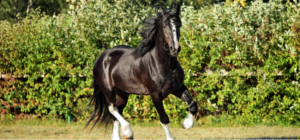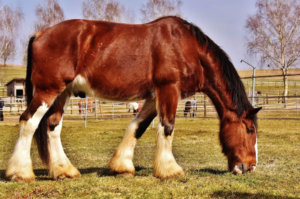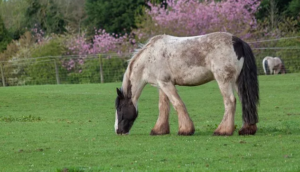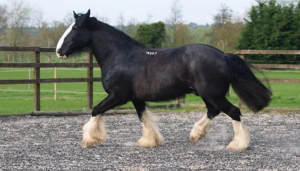Purchasing Price of a Shire Horse and Important Things to Look For
![]()

Shire Horse
Purchasing Price of a Shire Horse and Important Things to Look For
Buying a horse is an exciting and rewarding experience, but it can also be overwhelming. With so many factors to consider, it’s important to do your research and carefully evaluate each horse before making a decision.
When considering the purchase of a shire horse, it is important to take into account their unique characteristics and needs. Here are some additional factors to consider:
-
Price of Shire Horse: Shire horses can be more expensive than other breeds due to their size and rarity. Prices can range from a few thousand dollars to tens of thousands of dollars, depending on factors such as age, training, and pedigree.
-
Training: Shire horses are typically used for driving and pulling, so it is important to consider their training and experience in these areas.
-
Size and weight: Shire horses are one of the largest breeds, so it is important to consider their size and weight when evaluating their
If you are looking for a Professional Horse Veterinarian, please click here: Horse Vet

Shire Horse
Important things to look for when purchasing your first Shire horse
Factors Influencing Shire Horse Price:
a. Age and Training Level:
The age and training level of a Shire horse significantly impact its price. Younger horses with less training generally have a lower price tag compared to well-trained, experienced horses. Young Shire horses require more time and effort to develop their skills and manners, which reflects in their pricing. However, older horses with extensive training and a proven track record in specific disciplines may command higher prices due to their experience and reliability. Consider your own experience and goals when evaluating the age and training level that best suits your needs and budget.
b. Conformation and Bloodlines:
Conformation refers to the physical structure and proportions of a Shire horse. A Shire with excellent conformation, such as a well-balanced body, straight legs, strong back, and proper proportions, is generally more desirable and can influence the price. Horses with superior conformation tend to have better movement, soundness, and potential for success in various disciplines. Additionally, bloodlines play a role in pricing, as Shire horses from prestigious bloodlines or with notable ancestors may have higher value due to the potential for passing on desirable traits to future offspring.
c. Gender:
The gender of a Shire horse can also impact its price. Geldings (castrated males) are often priced lower than mares (females) and stallions (intact males). This is because geldings are generally considered more manageable, predictable, and suitable for a broader range of riders and disciplines. Mares may have higher prices due to their potential as broodmares or if they possess exceptional qualities for breeding purposes. Stallions, on the other hand, may command higher prices if they have proven themselves in specific disciplines or possess exceptional bloodlines.
d. Coloration:
While coloration does not affect the horse’s abilities or performance, certain coat colors and markings can influence the price of a Shire horse. The traditional color for Shires is black, but other colors like gray, bay, and chestnut also exist. Rare or less common colors or patterns, such as roan or piebald, may fetch higher prices due to their uniqueness and aesthetic appeal. However, it’s important to prioritize qualities such as temperament, conformation, and training over color when making a purchase decision.
e. Health and Veterinary Records:
The health and veterinary records of a Shire horse play a crucial role in determining its price. Horses with a clean bill of health, recent vaccinations, regular deworming, and up-to-date dental care may have higher prices. A well-maintained and sound horse, free from significant health issues or chronic conditions, is generally more valuable. Buyers often request a pre-purchase veterinary examination to assess the horse’s health thoroughly. Any history of injuries, illnesses, or genetic predispositions to certain conditions should be disclosed and factored into the pricing.
If you are looking for a Professional Horse Veterinarian, please click here: Horse Vet
Understanding these factors will help you gauge the value of a Shire horse based on its age, training level, conformation, bloodlines, gender, coloration, and health status. By considering these aspects, you can make an informed decision and find a Shire horse that meets your requirements and fits your budget.

Shire Horse
Finding Reputable Shire Horse Sellers:
a. Researching Reliable Breeders and Sellers:
When searching for a reputable Shire horse seller, thorough research is essential. Start by identifying well-established breeders and sellers who specialize in Shire horses. Look for those who have been in the industry for a considerable period and have a track record of producing high-quality Shire horses. Online directories, breed-specific publications, and local horse associations can be valuable resources for finding reputable breeders and sellers.
Visit their websites or social media pages to gather information about their breeding programs, horse care practices, and overall philosophy. Pay attention to the level of professionalism and transparency they demonstrate in their online presence. Reliable sellers often provide detailed information about their horses, including pedigrees, training history, and photographs or videos.
b. Evaluating Reputation and References:
One of the best ways to assess a Shire horse seller’s reputation is by seeking references from previous buyers and industry professionals. Reach out to individuals who have purchased horses from the seller in the past and ask about their experiences. Inquire about the seller’s honesty, integrity, and the overall quality of the horses they provide.
Additionally, participate in online forums or social media groups focused on Shire horses to gather insights and recommendations from fellow enthusiasts. These communities often share their experiences with different sellers and breeders, helping you make more informed decisions.
Consider attending horse shows, breed exhibitions, or other equine events where reputable sellers showcase their Shire horses. Observing the horses in person allows you to assess their quality, temperament, and overall condition. It also provides an opportunity to engage with the seller directly, ask questions, and gather more information.
Don’t hesitate to ask the seller for references or testimonials from satisfied buyers. A trustworthy seller will gladly provide these details to demonstrate their credibility and build trust.
Furthermore, research any complaints or negative feedback about the seller. Online forums, review platforms, and breed-specific forums can offer insights into others’ experiences. However, it’s essential to approach these sources with a critical mindset, considering that opinions can be subjective and based on individual circumstances.
By researching reliable breeders and sellers and evaluating their reputation and references, you can minimize the risk of dealing with dishonest or unscrupulous sellers. The goal is to find a reputable seller who prioritizes the health, well-being, and accurate representation of their Shire horses, ensuring a positive buying experience for you.
If you are looking for a Professional Horse Veterinarian, please click here: Horse Vet
Before Purchasing your First Shire Horse
5. Physical Examination and Health Considerations:
a. Pre-Purchase Veterinary Examination:
Before finalizing the purchase of a Shire horse, it is highly recommended to conduct a pre-purchase veterinary examination. This examination is performed by a qualified veterinarian who will assess the horse’s overall health, soundness, and detect any underlying health issues.
The veterinarian will thoroughly examine the horse, including checking its vital signs, eyes, teeth, heart, lungs, and musculoskeletal system. They may also conduct additional diagnostic tests, such as X-rays or bloodwork, to evaluate the horse’s condition more comprehensively. The examination aims to identify any potential health problems or soundness issues that may affect the horse’s performance or longevity.
b. Soundness and Conformation:
Soundness refers to the horse’s physical fitness and absence of lameness or structural issues. During the physical examination, the veterinarian will assess the horse’s gait and movement for any signs of lameness, such as unevenness, stiffness, or reluctance to bear weight on certain limbs. They will also evaluate the horse’s conformation, looking for proper alignment of limbs, a strong back, and overall balance.
Good conformation is crucial as it can affect the horse’s soundness, performance, and long-term well-being. Horses with conformational flaws may be more prone to certain injuries or physical limitations. Therefore, it is essential to ensure that the Shire horse you intend to purchase has soundness and conformation suitable for your desired activities and disciplines.
c. Genetic Testing for Inherited Diseases:
Some horse breeds, including Shire horses, can be susceptible to certain inherited diseases or genetic conditions. Genetic testing can help identify these potential risks, allowing you to make informed decisions about purchasing a horse.
Consult with your veterinarian or a genetic testing service that specializes in equine genetics to determine which tests are recommended for Shire horses. Common genetic tests for Shires may include tests for conditions such as polysaccharide storage myopathy (PSSM), hyperkalemic periodic paralysis (HYPP), or hereditary equine regional dermal asthenia (HERDA). By identifying any genetic predispositions, you can better understand the potential health risks associated with a particular horse and make appropriate management decisions.
Genetic testing can also be important if you plan to breed the horse in the future. Knowing the genetic status of a horse allows you to make responsible breeding choices and avoid passing on genetic diseases to future generations.
By conducting a pre-purchase veterinary examination, evaluating soundness and conformation, and considering genetic testing for inherited diseases, you can ensure that the Shire horse you choose is in good health, physically capable, and free from significant genetic risks. These considerations contribute to the overall well-being and longevity of the horse, as well as your own peace of mind as a responsible owner.

Shire Horse
Here are the top ten factors to consider when buying a horse, along with specific considerations for purchasing a shire horse:
-
Horse breed and type:
The breed and type of horse you choose will depend on your riding goals, preferences, and experience level. Some breeds are better suited for certain disciplines, such as Thoroughbreds for racing and Quarter Horses for western riding. When considering a shire horse, it is important to note that they are a draft breed, which means they are typically used for driving, pulling, and heavy work rather than riding. -
Age and health status:
The age and health status of a horse can affect its ability to perform and its long-term soundness. Younger horses may have more potential but require more training and may be more prone to injury. Older horses may be more experienced but may have health issues or limitations. When purchasing a shire horse, it is important to consider their size and weight, as they can be prone to joint and bone issues. -
Temperament and training of Shire Horse:
A horse’s temperament and training level can greatly impact your riding experience. A well-trained and calm horse is ideal for beginners or those with limited experience, while a more spirited and experienced horse may be more suitable for advanced riders. When considering a shire horse, it is important to note that they are typically known for their calm, gentle temperament. -
Size and conformation:
The size and conformation of a horse can affect its athletic ability, soundness, and comfort. Consider the horse’s height, weight, and body structure in relation to your own size and riding goals. When considering a shire horse, it is important to note that they are one of the largest breeds, with an average height of 16 to 17 hands and a weight of up to 2,000 pounds. -
Riding discipline and experience level:
Different disciplines require different skills and abilities from a horse. Consider your riding discipline and experience level when selecting a horse. When considering a shire horse, it is important to note that they are typically not used for riding disciplines, but rather for driving and pulling. -
Soundness and lameness issues from Shire Horse:
A horse’s soundness is essential for its long-term performance and health. Conduct a thorough soundness evaluation, including a lameness exam, before purchasing a horse. Chronic or severe lameness issues can be costly to treat and can limit the horse’s ability to perform. When considering a shire horse, it is important to pay special attention to their joints and bones, as they can be prone to issues such as arthritis. -
Pre-purchase exam and veterinary records:
Always conduct a pre-purchase exam with a qualified veterinarian before buying a horse. This exam will help identify any health issues or potential problems that may not be immediately apparent. Review the horse’s veterinary records to ensure that it has been well-cared for and has no underlying health issues. When considering a shire horse, it is important to pay special attention to their weight and joint health. -
Environment and facilities:
Consider the environment and facilities where the horse will be kept. The horse should have access to adequate food, water, shelter, and turn-out space. Evaluate the quality and safety of the barn, stalls, fencing, and pastures. When considering a shire horse, it is important to note that they require a lot of space and may not be suitable for small farms or facilities. -
Cost and budget considerations:
Buying a horse can be expensive, and ongoing costs such as feed, veterinary care, and training can add up quickly. Consider your budget and financial resources before making a purchase. Factor in the cost of transportation, equipment, and ongoing care when making a decision. When considering a shire horse, it is important to note that they can be more expensive than other breeds due to their size and rarity. -
Seller reputation and background:
Research the seller’s reputation and background before making a purchase. Look for reviews, references, and recommendations. Ask for a bill of sale and review the contract carefully before signing.
If you are looking for a Professional Horse Veterinarian, please click here: Horse Vet
Free Reports
- Cockatiel Sounds: What Type of Sounds Do Cockatiels Make?
- Cane Corso Lab Mix: What You Need To Know Before Adopting Your New Cane Corso Lab Mix
- Belgian Malinois Grooming: How to Properly Care For Your Belgian Malinois
- Hamster Vomiting: What You Need To Do When Your Hamster is Vomiting
- Manchester Terrier Price: What You Should Before Adopting Your Manchester Terrier
- Boerboel Life Span: How Long Do Boerboel Dogs Usually Live?
- Canaan Dog Price: Everything You Should Know About Canaan Dogs Before Adopting
- Do Cane Corso Shed: How Much Cane Corsos Shed and How to Prevent Shedding
- Cane Corso German Shepherd Mix: Everything They Don’t Tell You About This Unique Mix
- Cane Corso Doberman Mix: Check Before You Buy! What They Don’t Tell You About Cane Corso Doberman Mixes
- Brindle Cane Corso: What You Need to Know Before Adopting
- Cockatiel Eye Problems: What to Do When Your Cockatiel Has an Eye Infection
- Top 25 Sun Conure Names: How to Name a Sun Conure, Care Tips and Tricks
- Friesian Horse Price: Everything You Need to Know Before You Buy a Friesian Horse
- Friesian Colors: The Uniqueness of Every Friesian Horse Color, Price and Care Tips